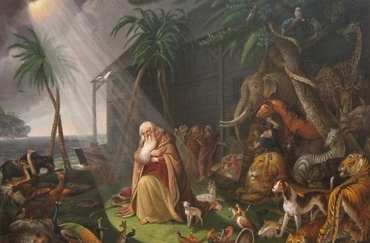Beast

In Genesis 1:24, beasts signify the things of man's will or loves. (Arcana Coelestia 44, 46)
In Genesis 9:10, beasts signify all that was living in the man of the Ancient Church, and also what belonged to his new will; likewise the lower things of his understanding and the will therefrom. (Arcana Coelestia 1026-1029)
In Psalm 104:20, beasts signify affections longing to be instructed, or spiritually nourished. (Apocalypse Explained 650[10])
In Luke 10:35, since the beast was a donkey, this signifies to instruct another according to his capability. (Apocalypse Explained 1154)
The beast of the south (Isaiah 30:6) signifies people who are principled in the knowledges of good and of truth, but do not apply them to life and instead to science.
Every beast and creeping thing (Genesis 8:19) signifies the goodnesses of the internal and external man.
"Beasts" represent the affection for doing good things, a true desire to do them from the heart. In the negative sense, "beasts" stand for the lust to do evil.
The beast ascending out of the sea (Revelation 13:1) signifies reasonings from the natural man confirming the separation of faith from life.
(References: Apocalypse Explained 13, 773; Revelation 13:11)
Arcana Coelestia #3761
3761. 'Jacob lifted up his feet' means a raising up of the natural. This is clear from the meaning of 'lifting up' as a raising up, and from the meaning of 'the feet' as the natural, dealt with below. The raising up meant here is the subject of the chapter itself, namely a raising up from external truth towards internal good. In the highest sense the subject is how the Lord according to order raised His Natural even up to the Divine, rising up step by step from external truth towards internal good. In the representative sense it is how the Lord according to a similar order makes man's natural new when regenerating him. The fact that a person who is being regenerated in adult life progresses according to the order described in the internal sense of this chapter and of those that follow is known to few. This fact is known to few because few stop to reflect on the matter and also because few at the present day are able to be regenerated; for the last days of the Church have arrived when no charity exists any longer, nor consequently any faith. This being so, people do not even know what faith is, even though the assertion 'men is saved by faith' is on everyone's lips; and not knowing this they therefore have even less knowledge of what charity is. And since they know no more than the terms faith and charity and have no knowledge of what these are essentially, it has therefore been stated that few are able to reflect on the order in accordance with which a person is made new or regenerated, and also that few are able to be regenerated.
[2] Because the subject here is the natural, and the latter is represented by 'Jacob', it is not said that he rose up and went to the land of the sons of the east but that 'he lifted up his feet'. Both these expressions mean a raising up. As regards 'rising up' having this meaning, see 2401, 2785, 2912, 2927, 3171; and as regards the expression 'lifting up the feet' which occurs here, this is used in reference to the natural - 'the feet' meaning the natural, see 2162, 3147. 'The feet' means the natural or natural things because of their correspondence with the Grand Man - currently the subject at the ends of chapters. In the Grand Man those belonging to the province of the feet are those who dwell in natural light and little spiritual light. This also is why the parts beneath the foot - the sole and the heel - mean the lowest natural things, see 259, and why 'a shoe', which is also mentioned several times in the Word, means the bodily-natural, which is the lowest part of all, 1748.






